Holmes Institute: Herbalife Reborn Ethics Case Study
VerifiedAdded on 2022/11/14
|11
|3784
|189
Case Study
AI Summary
This case study examines the ethical dimensions of Herbalife's business practices, focusing on its multilevel compensation model and accusations of operating as a pyramid scheme. The assignment delves into the confusion surrounding Herbalife's model, comparing and contrasting it with legitimate business models. It explores the company's demonstration of social responsibility while addressing ethical dilemmas and bounded rationalities in decision-making. The analysis considers the impact of allegations, such as those concerning pyramidal schemes, and the implications for corporate social responsibility. The study also investigates the differences between legitimate business models and pyramid schemes, examining the legal and ethical considerations that differentiate them. It further explores the application of ethical decision-making frameworks in the context of Herbalife's business operations.
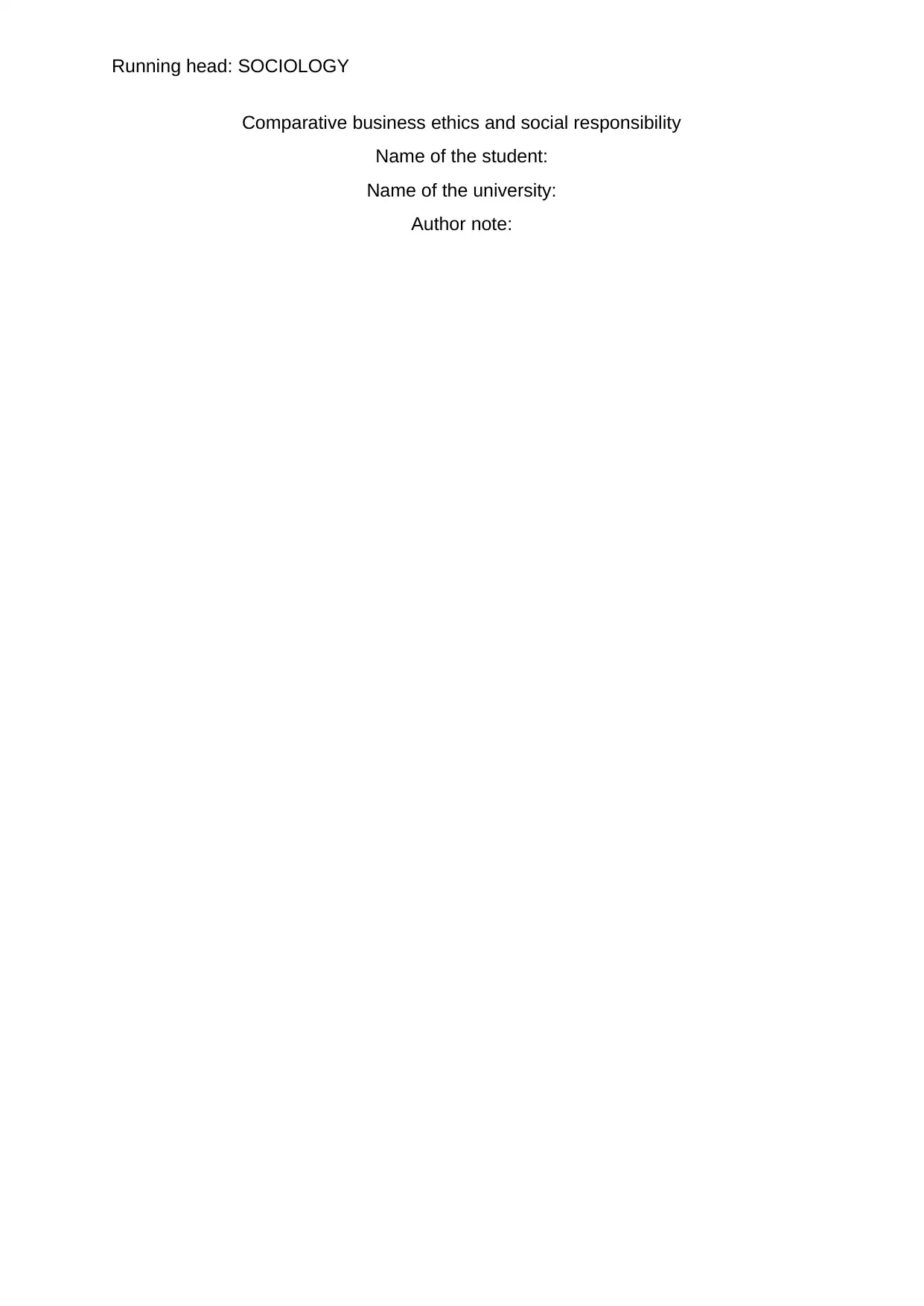
Running head: SOCIOLOGY
Comparative business ethics and social responsibility
Name of the student:
Name of the university:
Author note:
Comparative business ethics and social responsibility
Name of the student:
Name of the university:
Author note:
Paraphrase This Document
Need a fresh take? Get an instant paraphrase of this document with our AI Paraphraser
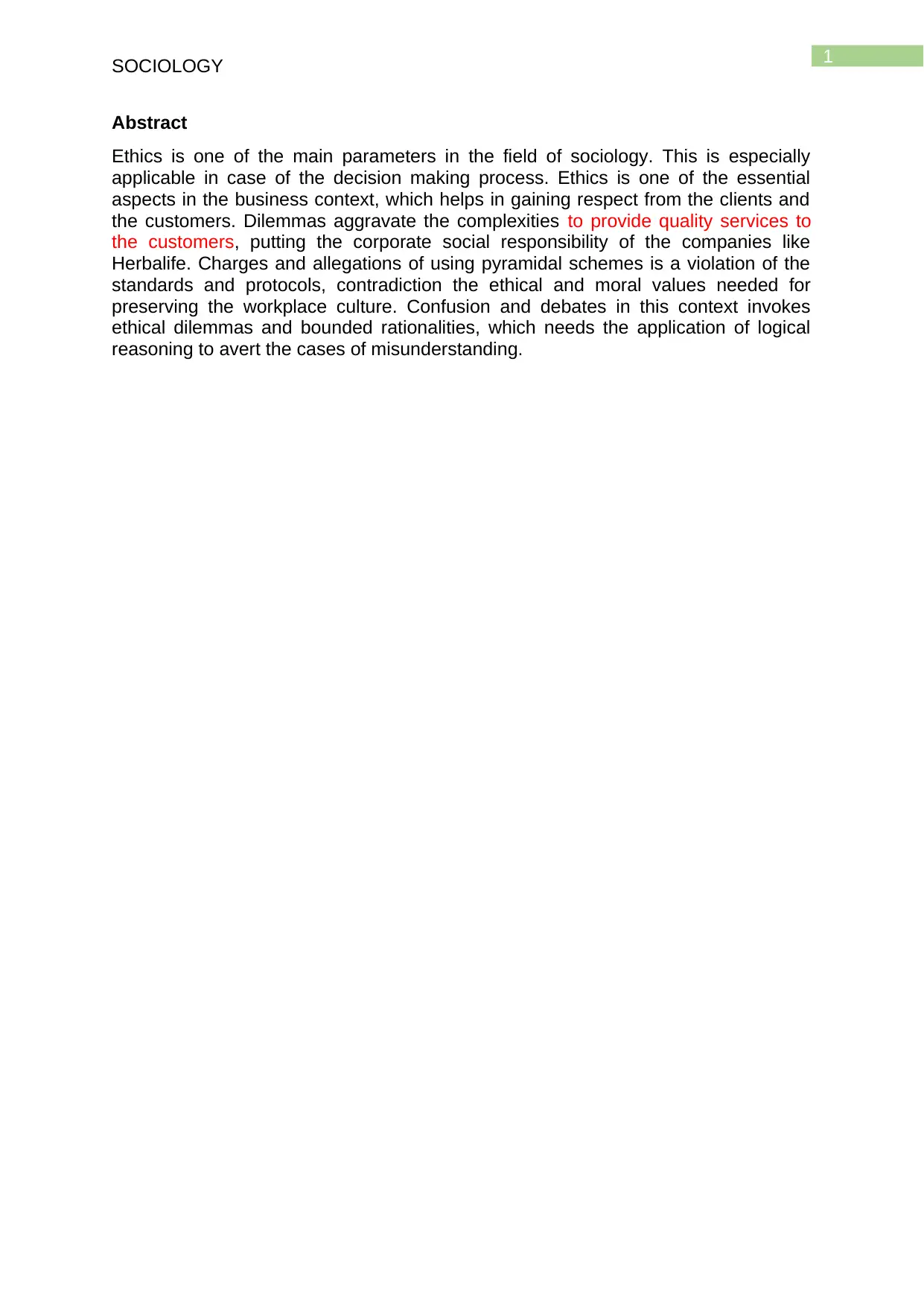
1
SOCIOLOGY
Abstract
Ethics is one of the main parameters in the field of sociology. This is especially
applicable in case of the decision making process. Ethics is one of the essential
aspects in the business context, which helps in gaining respect from the clients and
the customers. Dilemmas aggravate the complexities to provide quality services to
the customers, putting the corporate social responsibility of the companies like
Herbalife. Charges and allegations of using pyramidal schemes is a violation of the
standards and protocols, contradiction the ethical and moral values needed for
preserving the workplace culture. Confusion and debates in this context invokes
ethical dilemmas and bounded rationalities, which needs the application of logical
reasoning to avert the cases of misunderstanding.
SOCIOLOGY
Abstract
Ethics is one of the main parameters in the field of sociology. This is especially
applicable in case of the decision making process. Ethics is one of the essential
aspects in the business context, which helps in gaining respect from the clients and
the customers. Dilemmas aggravate the complexities to provide quality services to
the customers, putting the corporate social responsibility of the companies like
Herbalife. Charges and allegations of using pyramidal schemes is a violation of the
standards and protocols, contradiction the ethical and moral values needed for
preserving the workplace culture. Confusion and debates in this context invokes
ethical dilemmas and bounded rationalities, which needs the application of logical
reasoning to avert the cases of misunderstanding.
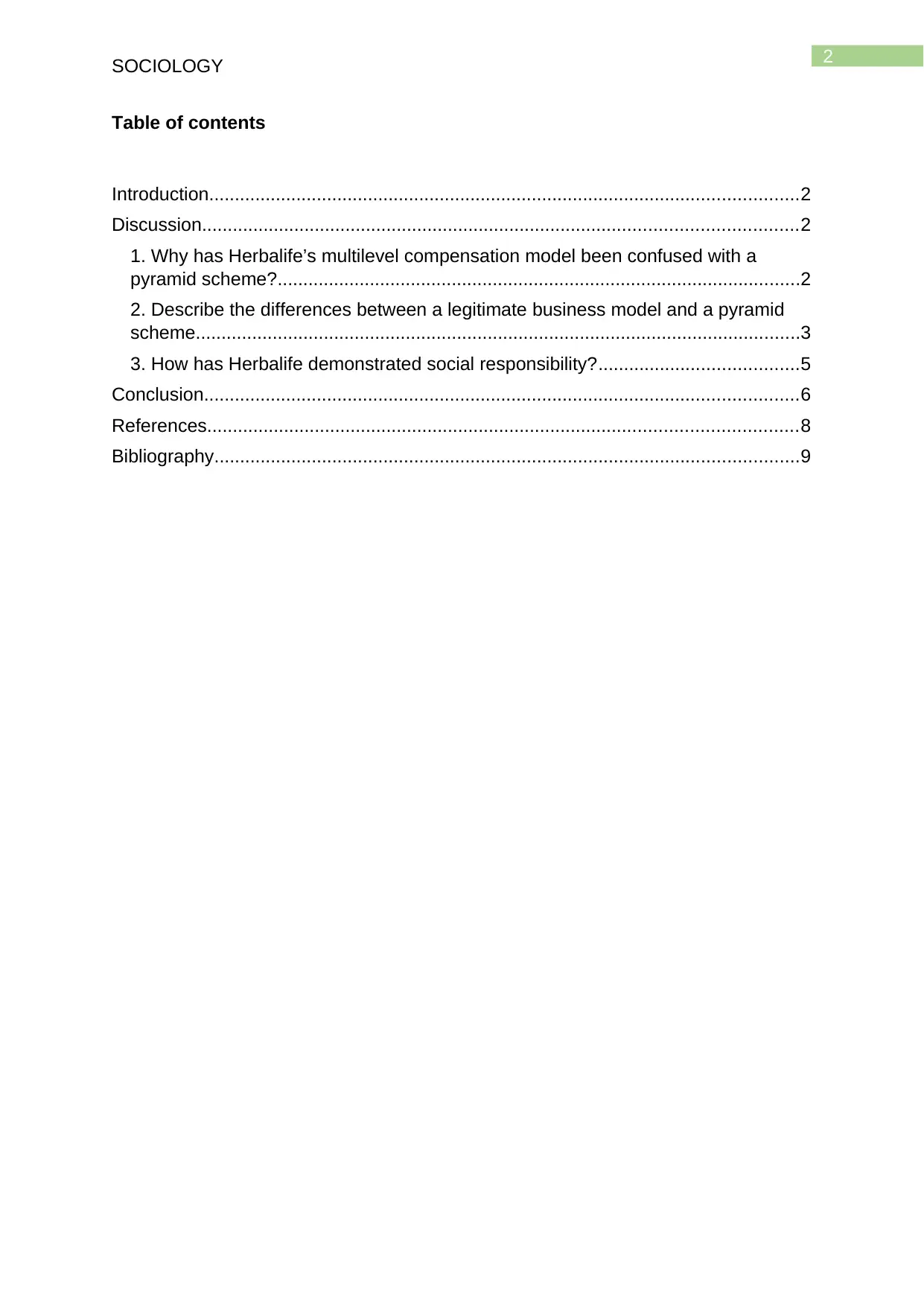
2
SOCIOLOGY
Table of contents
Introduction...................................................................................................................2
Discussion....................................................................................................................2
1. Why has Herbalife’s multilevel compensation model been confused with a
pyramid scheme?......................................................................................................2
2. Describe the differences between a legitimate business model and a pyramid
scheme......................................................................................................................3
3. How has Herbalife demonstrated social responsibility?.......................................5
Conclusion....................................................................................................................6
References...................................................................................................................8
Bibliography..................................................................................................................9
SOCIOLOGY
Table of contents
Introduction...................................................................................................................2
Discussion....................................................................................................................2
1. Why has Herbalife’s multilevel compensation model been confused with a
pyramid scheme?......................................................................................................2
2. Describe the differences between a legitimate business model and a pyramid
scheme......................................................................................................................3
3. How has Herbalife demonstrated social responsibility?.......................................5
Conclusion....................................................................................................................6
References...................................................................................................................8
Bibliography..................................................................................................................9
⊘ This is a preview!⊘
Do you want full access?
Subscribe today to unlock all pages.

Trusted by 1+ million students worldwide
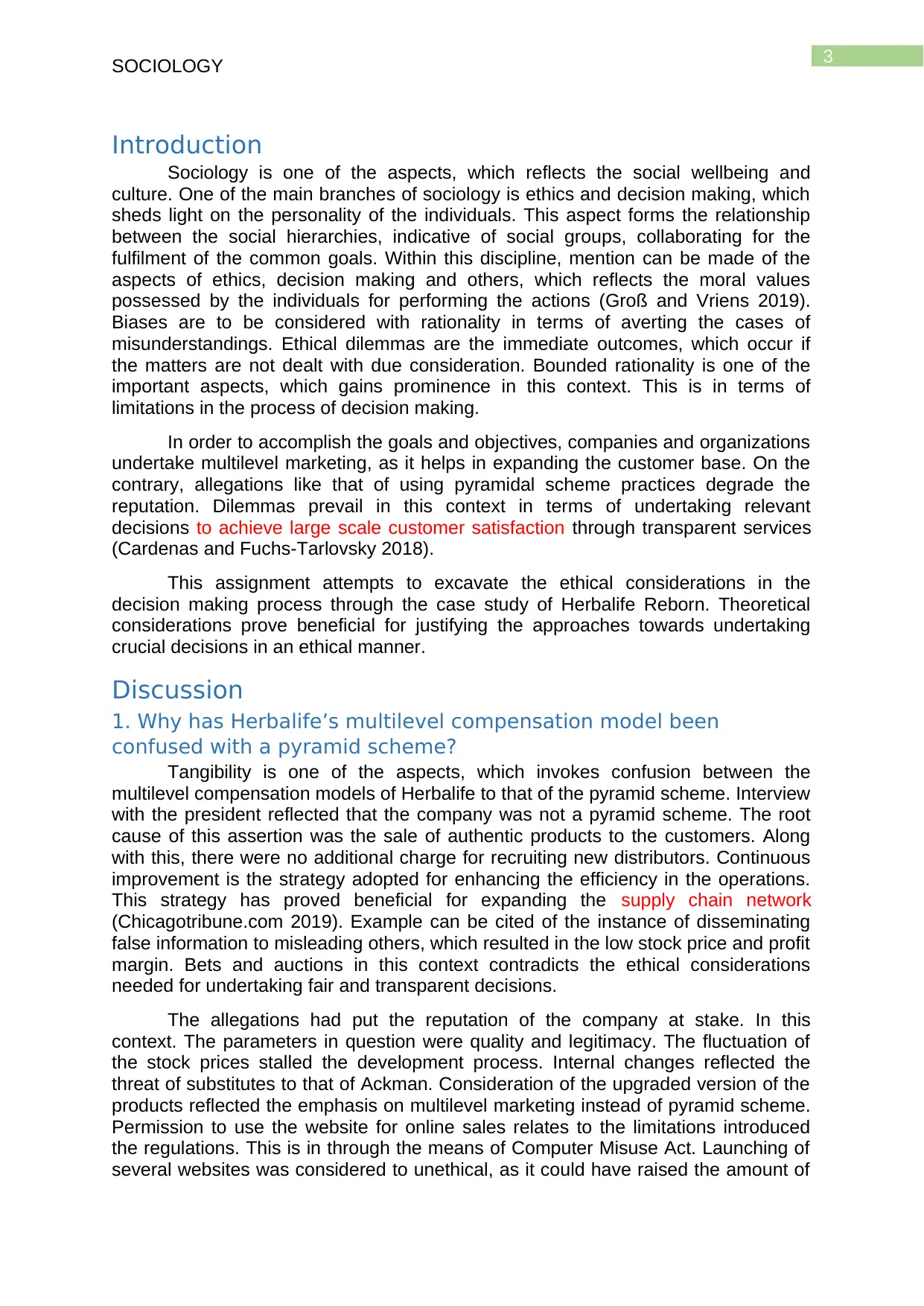
3
SOCIOLOGY
Introduction
Sociology is one of the aspects, which reflects the social wellbeing and
culture. One of the main branches of sociology is ethics and decision making, which
sheds light on the personality of the individuals. This aspect forms the relationship
between the social hierarchies, indicative of social groups, collaborating for the
fulfilment of the common goals. Within this discipline, mention can be made of the
aspects of ethics, decision making and others, which reflects the moral values
possessed by the individuals for performing the actions (Groß and Vriens 2019).
Biases are to be considered with rationality in terms of averting the cases of
misunderstandings. Ethical dilemmas are the immediate outcomes, which occur if
the matters are not dealt with due consideration. Bounded rationality is one of the
important aspects, which gains prominence in this context. This is in terms of
limitations in the process of decision making.
In order to accomplish the goals and objectives, companies and organizations
undertake multilevel marketing, as it helps in expanding the customer base. On the
contrary, allegations like that of using pyramidal scheme practices degrade the
reputation. Dilemmas prevail in this context in terms of undertaking relevant
decisions to achieve large scale customer satisfaction through transparent services
(Cardenas and Fuchs-Tarlovsky 2018).
This assignment attempts to excavate the ethical considerations in the
decision making process through the case study of Herbalife Reborn. Theoretical
considerations prove beneficial for justifying the approaches towards undertaking
crucial decisions in an ethical manner.
Discussion
1. Why has Herbalife’s multilevel compensation model been
confused with a pyramid scheme?
Tangibility is one of the aspects, which invokes confusion between the
multilevel compensation models of Herbalife to that of the pyramid scheme. Interview
with the president reflected that the company was not a pyramid scheme. The root
cause of this assertion was the sale of authentic products to the customers. Along
with this, there were no additional charge for recruiting new distributors. Continuous
improvement is the strategy adopted for enhancing the efficiency in the operations.
This strategy has proved beneficial for expanding the supply chain network
(Chicagotribune.com 2019). Example can be cited of the instance of disseminating
false information to misleading others, which resulted in the low stock price and profit
margin. Bets and auctions in this context contradicts the ethical considerations
needed for undertaking fair and transparent decisions.
The allegations had put the reputation of the company at stake. In this
context. The parameters in question were quality and legitimacy. The fluctuation of
the stock prices stalled the development process. Internal changes reflected the
threat of substitutes to that of Ackman. Consideration of the upgraded version of the
products reflected the emphasis on multilevel marketing instead of pyramid scheme.
Permission to use the website for online sales relates to the limitations introduced
the regulations. This is in through the means of Computer Misuse Act. Launching of
several websites was considered to unethical, as it could have raised the amount of
SOCIOLOGY
Introduction
Sociology is one of the aspects, which reflects the social wellbeing and
culture. One of the main branches of sociology is ethics and decision making, which
sheds light on the personality of the individuals. This aspect forms the relationship
between the social hierarchies, indicative of social groups, collaborating for the
fulfilment of the common goals. Within this discipline, mention can be made of the
aspects of ethics, decision making and others, which reflects the moral values
possessed by the individuals for performing the actions (Groß and Vriens 2019).
Biases are to be considered with rationality in terms of averting the cases of
misunderstandings. Ethical dilemmas are the immediate outcomes, which occur if
the matters are not dealt with due consideration. Bounded rationality is one of the
important aspects, which gains prominence in this context. This is in terms of
limitations in the process of decision making.
In order to accomplish the goals and objectives, companies and organizations
undertake multilevel marketing, as it helps in expanding the customer base. On the
contrary, allegations like that of using pyramidal scheme practices degrade the
reputation. Dilemmas prevail in this context in terms of undertaking relevant
decisions to achieve large scale customer satisfaction through transparent services
(Cardenas and Fuchs-Tarlovsky 2018).
This assignment attempts to excavate the ethical considerations in the
decision making process through the case study of Herbalife Reborn. Theoretical
considerations prove beneficial for justifying the approaches towards undertaking
crucial decisions in an ethical manner.
Discussion
1. Why has Herbalife’s multilevel compensation model been
confused with a pyramid scheme?
Tangibility is one of the aspects, which invokes confusion between the
multilevel compensation models of Herbalife to that of the pyramid scheme. Interview
with the president reflected that the company was not a pyramid scheme. The root
cause of this assertion was the sale of authentic products to the customers. Along
with this, there were no additional charge for recruiting new distributors. Continuous
improvement is the strategy adopted for enhancing the efficiency in the operations.
This strategy has proved beneficial for expanding the supply chain network
(Chicagotribune.com 2019). Example can be cited of the instance of disseminating
false information to misleading others, which resulted in the low stock price and profit
margin. Bets and auctions in this context contradicts the ethical considerations
needed for undertaking fair and transparent decisions.
The allegations had put the reputation of the company at stake. In this
context. The parameters in question were quality and legitimacy. The fluctuation of
the stock prices stalled the development process. Internal changes reflected the
threat of substitutes to that of Ackman. Consideration of the upgraded version of the
products reflected the emphasis on multilevel marketing instead of pyramid scheme.
Permission to use the website for online sales relates to the limitations introduced
the regulations. This is in through the means of Computer Misuse Act. Launching of
several websites was considered to unethical, as it could have raised the amount of
Paraphrase This Document
Need a fresh take? Get an instant paraphrase of this document with our AI Paraphraser
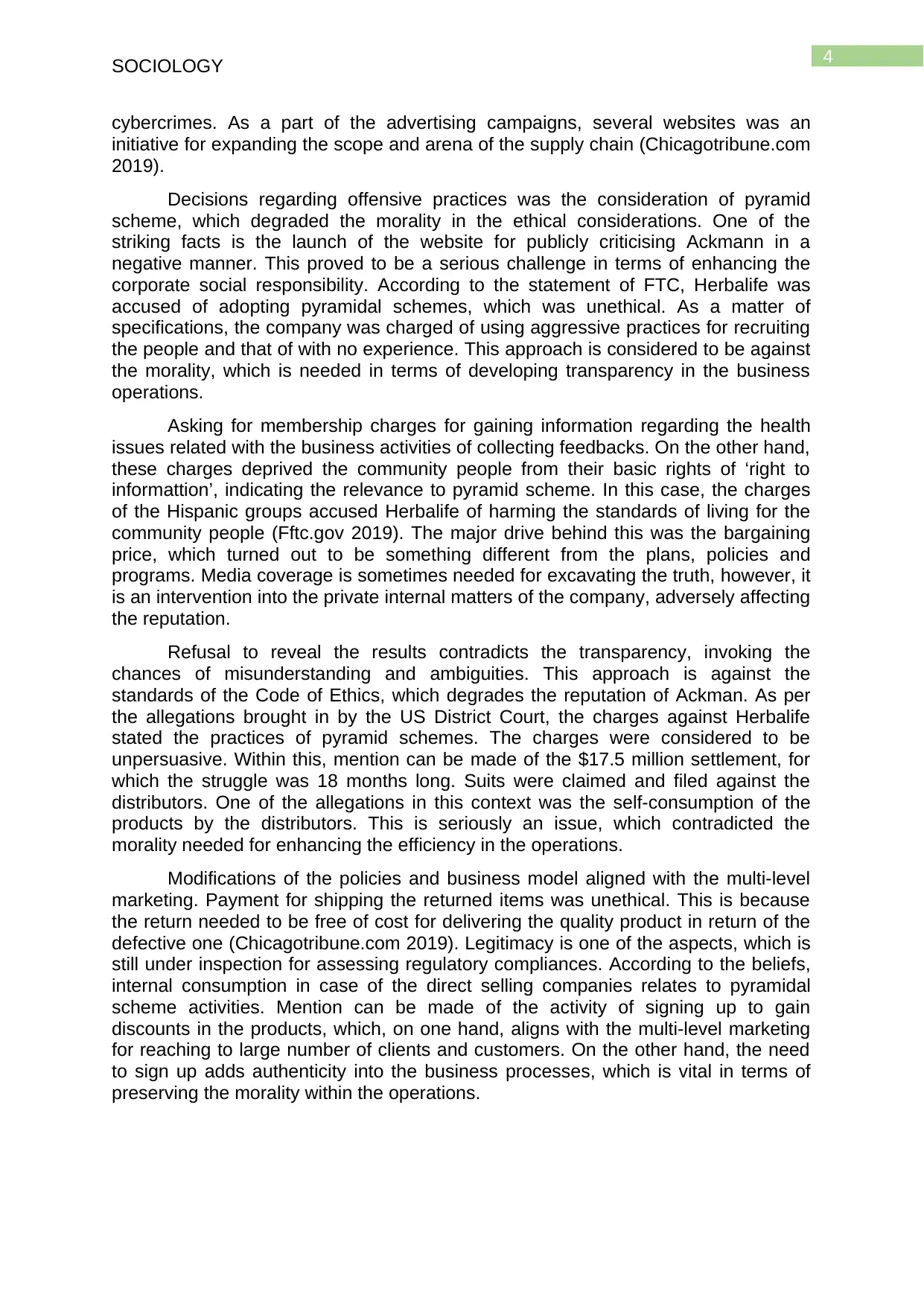
4
SOCIOLOGY
cybercrimes. As a part of the advertising campaigns, several websites was an
initiative for expanding the scope and arena of the supply chain (Chicagotribune.com
2019).
Decisions regarding offensive practices was the consideration of pyramid
scheme, which degraded the morality in the ethical considerations. One of the
striking facts is the launch of the website for publicly criticising Ackmann in a
negative manner. This proved to be a serious challenge in terms of enhancing the
corporate social responsibility. According to the statement of FTC, Herbalife was
accused of adopting pyramidal schemes, which was unethical. As a matter of
specifications, the company was charged of using aggressive practices for recruiting
the people and that of with no experience. This approach is considered to be against
the morality, which is needed in terms of developing transparency in the business
operations.
Asking for membership charges for gaining information regarding the health
issues related with the business activities of collecting feedbacks. On the other hand,
these charges deprived the community people from their basic rights of ‘right to
informattion’, indicating the relevance to pyramid scheme. In this case, the charges
of the Hispanic groups accused Herbalife of harming the standards of living for the
community people (Fftc.gov 2019). The major drive behind this was the bargaining
price, which turned out to be something different from the plans, policies and
programs. Media coverage is sometimes needed for excavating the truth, however, it
is an intervention into the private internal matters of the company, adversely affecting
the reputation.
Refusal to reveal the results contradicts the transparency, invoking the
chances of misunderstanding and ambiguities. This approach is against the
standards of the Code of Ethics, which degrades the reputation of Ackman. As per
the allegations brought in by the US District Court, the charges against Herbalife
stated the practices of pyramid schemes. The charges were considered to be
unpersuasive. Within this, mention can be made of the $17.5 million settlement, for
which the struggle was 18 months long. Suits were claimed and filed against the
distributors. One of the allegations in this context was the self-consumption of the
products by the distributors. This is seriously an issue, which contradicted the
morality needed for enhancing the efficiency in the operations.
Modifications of the policies and business model aligned with the multi-level
marketing. Payment for shipping the returned items was unethical. This is because
the return needed to be free of cost for delivering the quality product in return of the
defective one (Chicagotribune.com 2019). Legitimacy is one of the aspects, which is
still under inspection for assessing regulatory compliances. According to the beliefs,
internal consumption in case of the direct selling companies relates to pyramidal
scheme activities. Mention can be made of the activity of signing up to gain
discounts in the products, which, on one hand, aligns with the multi-level marketing
for reaching to large number of clients and customers. On the other hand, the need
to sign up adds authenticity into the business processes, which is vital in terms of
preserving the morality within the operations.
SOCIOLOGY
cybercrimes. As a part of the advertising campaigns, several websites was an
initiative for expanding the scope and arena of the supply chain (Chicagotribune.com
2019).
Decisions regarding offensive practices was the consideration of pyramid
scheme, which degraded the morality in the ethical considerations. One of the
striking facts is the launch of the website for publicly criticising Ackmann in a
negative manner. This proved to be a serious challenge in terms of enhancing the
corporate social responsibility. According to the statement of FTC, Herbalife was
accused of adopting pyramidal schemes, which was unethical. As a matter of
specifications, the company was charged of using aggressive practices for recruiting
the people and that of with no experience. This approach is considered to be against
the morality, which is needed in terms of developing transparency in the business
operations.
Asking for membership charges for gaining information regarding the health
issues related with the business activities of collecting feedbacks. On the other hand,
these charges deprived the community people from their basic rights of ‘right to
informattion’, indicating the relevance to pyramid scheme. In this case, the charges
of the Hispanic groups accused Herbalife of harming the standards of living for the
community people (Fftc.gov 2019). The major drive behind this was the bargaining
price, which turned out to be something different from the plans, policies and
programs. Media coverage is sometimes needed for excavating the truth, however, it
is an intervention into the private internal matters of the company, adversely affecting
the reputation.
Refusal to reveal the results contradicts the transparency, invoking the
chances of misunderstanding and ambiguities. This approach is against the
standards of the Code of Ethics, which degrades the reputation of Ackman. As per
the allegations brought in by the US District Court, the charges against Herbalife
stated the practices of pyramid schemes. The charges were considered to be
unpersuasive. Within this, mention can be made of the $17.5 million settlement, for
which the struggle was 18 months long. Suits were claimed and filed against the
distributors. One of the allegations in this context was the self-consumption of the
products by the distributors. This is seriously an issue, which contradicted the
morality needed for enhancing the efficiency in the operations.
Modifications of the policies and business model aligned with the multi-level
marketing. Payment for shipping the returned items was unethical. This is because
the return needed to be free of cost for delivering the quality product in return of the
defective one (Chicagotribune.com 2019). Legitimacy is one of the aspects, which is
still under inspection for assessing regulatory compliances. According to the beliefs,
internal consumption in case of the direct selling companies relates to pyramidal
scheme activities. Mention can be made of the activity of signing up to gain
discounts in the products, which, on one hand, aligns with the multi-level marketing
for reaching to large number of clients and customers. On the other hand, the need
to sign up adds authenticity into the business processes, which is vital in terms of
preserving the morality within the operations.
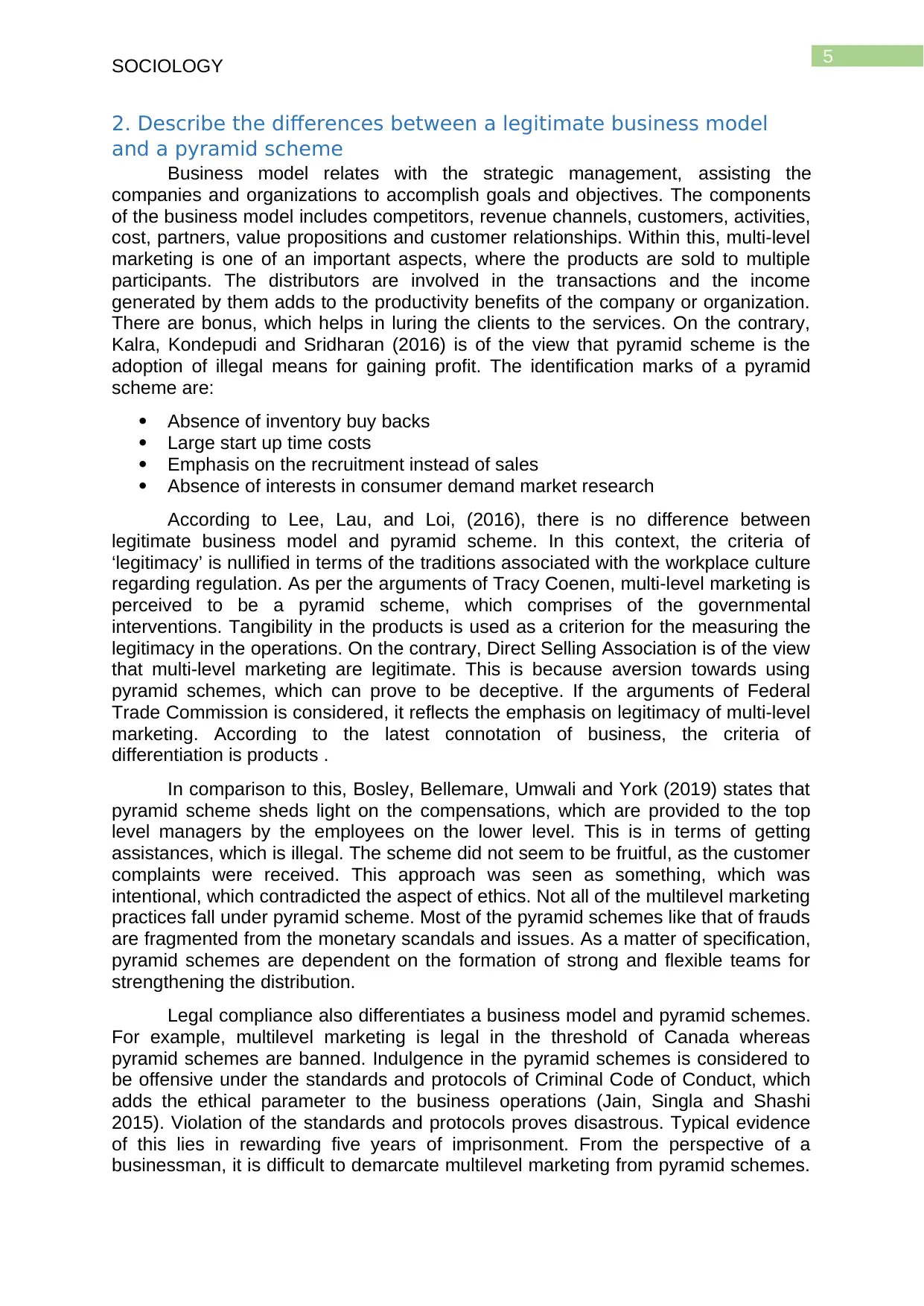
5
SOCIOLOGY
2. Describe the differences between a legitimate business model
and a pyramid scheme
Business model relates with the strategic management, assisting the
companies and organizations to accomplish goals and objectives. The components
of the business model includes competitors, revenue channels, customers, activities,
cost, partners, value propositions and customer relationships. Within this, multi-level
marketing is one of an important aspects, where the products are sold to multiple
participants. The distributors are involved in the transactions and the income
generated by them adds to the productivity benefits of the company or organization.
There are bonus, which helps in luring the clients to the services. On the contrary,
Kalra, Kondepudi and Sridharan (2016) is of the view that pyramid scheme is the
adoption of illegal means for gaining profit. The identification marks of a pyramid
scheme are:
Absence of inventory buy backs
Large start up time costs
Emphasis on the recruitment instead of sales
Absence of interests in consumer demand market research
According to Lee, Lau, and Loi, (2016), there is no difference between
legitimate business model and pyramid scheme. In this context, the criteria of
‘legitimacy’ is nullified in terms of the traditions associated with the workplace culture
regarding regulation. As per the arguments of Tracy Coenen, multi-level marketing is
perceived to be a pyramid scheme, which comprises of the governmental
interventions. Tangibility in the products is used as a criterion for the measuring the
legitimacy in the operations. On the contrary, Direct Selling Association is of the view
that multi-level marketing are legitimate. This is because aversion towards using
pyramid schemes, which can prove to be deceptive. If the arguments of Federal
Trade Commission is considered, it reflects the emphasis on legitimacy of multi-level
marketing. According to the latest connotation of business, the criteria of
differentiation is products .
In comparison to this, Bosley, Bellemare, Umwali and York (2019) states that
pyramid scheme sheds light on the compensations, which are provided to the top
level managers by the employees on the lower level. This is in terms of getting
assistances, which is illegal. The scheme did not seem to be fruitful, as the customer
complaints were received. This approach was seen as something, which was
intentional, which contradicted the aspect of ethics. Not all of the multilevel marketing
practices fall under pyramid scheme. Most of the pyramid schemes like that of frauds
are fragmented from the monetary scandals and issues. As a matter of specification,
pyramid schemes are dependent on the formation of strong and flexible teams for
strengthening the distribution.
Legal compliance also differentiates a business model and pyramid schemes.
For example, multilevel marketing is legal in the threshold of Canada whereas
pyramid schemes are banned. Indulgence in the pyramid schemes is considered to
be offensive under the standards and protocols of Criminal Code of Conduct, which
adds the ethical parameter to the business operations (Jain, Singla and Shashi
2015). Violation of the standards and protocols proves disastrous. Typical evidence
of this lies in rewarding five years of imprisonment. From the perspective of a
businessman, it is difficult to demarcate multilevel marketing from pyramid schemes.
SOCIOLOGY
2. Describe the differences between a legitimate business model
and a pyramid scheme
Business model relates with the strategic management, assisting the
companies and organizations to accomplish goals and objectives. The components
of the business model includes competitors, revenue channels, customers, activities,
cost, partners, value propositions and customer relationships. Within this, multi-level
marketing is one of an important aspects, where the products are sold to multiple
participants. The distributors are involved in the transactions and the income
generated by them adds to the productivity benefits of the company or organization.
There are bonus, which helps in luring the clients to the services. On the contrary,
Kalra, Kondepudi and Sridharan (2016) is of the view that pyramid scheme is the
adoption of illegal means for gaining profit. The identification marks of a pyramid
scheme are:
Absence of inventory buy backs
Large start up time costs
Emphasis on the recruitment instead of sales
Absence of interests in consumer demand market research
According to Lee, Lau, and Loi, (2016), there is no difference between
legitimate business model and pyramid scheme. In this context, the criteria of
‘legitimacy’ is nullified in terms of the traditions associated with the workplace culture
regarding regulation. As per the arguments of Tracy Coenen, multi-level marketing is
perceived to be a pyramid scheme, which comprises of the governmental
interventions. Tangibility in the products is used as a criterion for the measuring the
legitimacy in the operations. On the contrary, Direct Selling Association is of the view
that multi-level marketing are legitimate. This is because aversion towards using
pyramid schemes, which can prove to be deceptive. If the arguments of Federal
Trade Commission is considered, it reflects the emphasis on legitimacy of multi-level
marketing. According to the latest connotation of business, the criteria of
differentiation is products .
In comparison to this, Bosley, Bellemare, Umwali and York (2019) states that
pyramid scheme sheds light on the compensations, which are provided to the top
level managers by the employees on the lower level. This is in terms of getting
assistances, which is illegal. The scheme did not seem to be fruitful, as the customer
complaints were received. This approach was seen as something, which was
intentional, which contradicted the aspect of ethics. Not all of the multilevel marketing
practices fall under pyramid scheme. Most of the pyramid schemes like that of frauds
are fragmented from the monetary scandals and issues. As a matter of specification,
pyramid schemes are dependent on the formation of strong and flexible teams for
strengthening the distribution.
Legal compliance also differentiates a business model and pyramid schemes.
For example, multilevel marketing is legal in the threshold of Canada whereas
pyramid schemes are banned. Indulgence in the pyramid schemes is considered to
be offensive under the standards and protocols of Criminal Code of Conduct, which
adds the ethical parameter to the business operations (Jain, Singla and Shashi
2015). Violation of the standards and protocols proves disastrous. Typical evidence
of this lies in rewarding five years of imprisonment. From the perspective of a
businessman, it is difficult to demarcate multilevel marketing from pyramid schemes.
⊘ This is a preview!⊘
Do you want full access?
Subscribe today to unlock all pages.

Trusted by 1+ million students worldwide
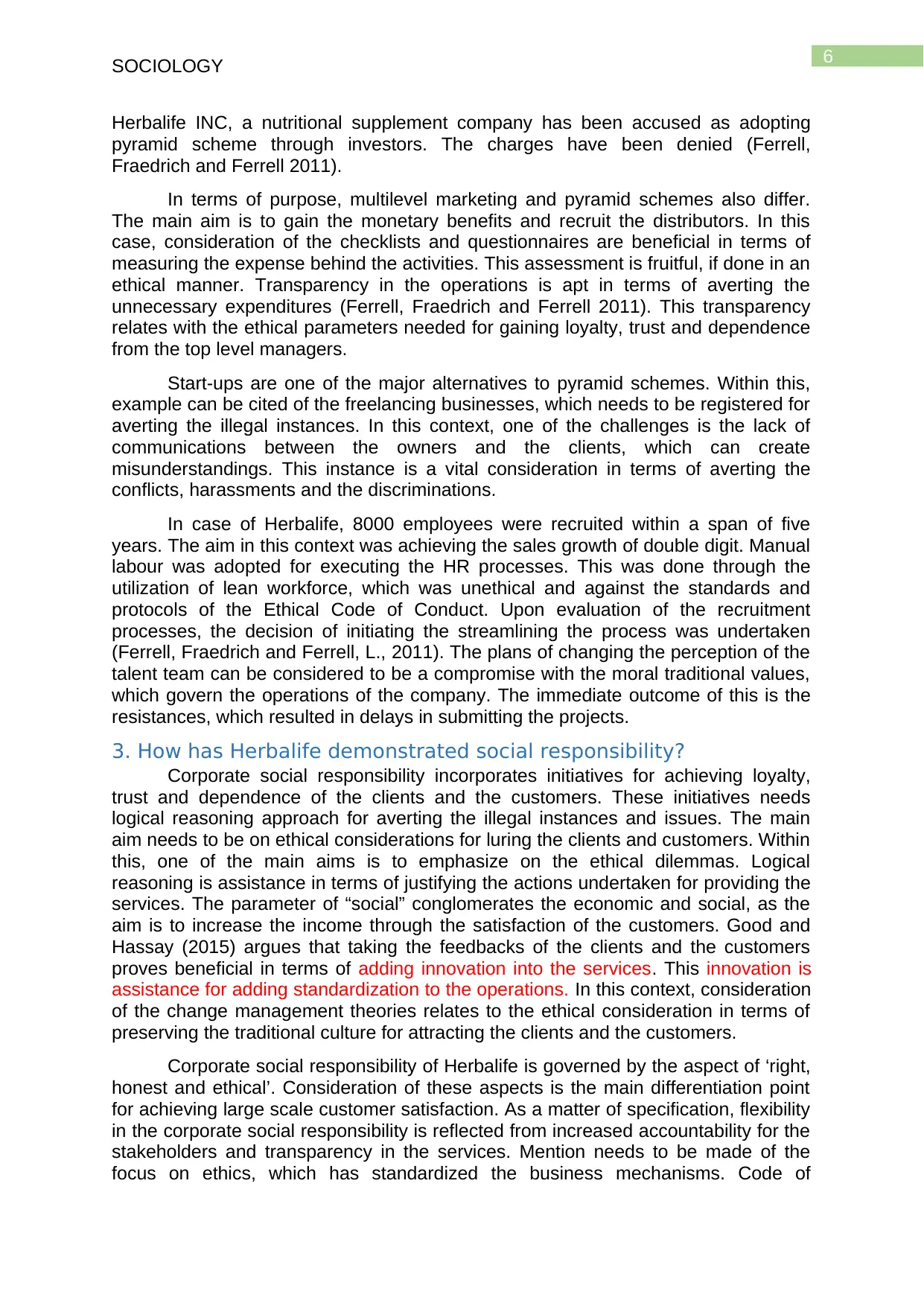
6
SOCIOLOGY
Herbalife INC, a nutritional supplement company has been accused as adopting
pyramid scheme through investors. The charges have been denied (Ferrell,
Fraedrich and Ferrell 2011).
In terms of purpose, multilevel marketing and pyramid schemes also differ.
The main aim is to gain the monetary benefits and recruit the distributors. In this
case, consideration of the checklists and questionnaires are beneficial in terms of
measuring the expense behind the activities. This assessment is fruitful, if done in an
ethical manner. Transparency in the operations is apt in terms of averting the
unnecessary expenditures (Ferrell, Fraedrich and Ferrell 2011). This transparency
relates with the ethical parameters needed for gaining loyalty, trust and dependence
from the top level managers.
Start-ups are one of the major alternatives to pyramid schemes. Within this,
example can be cited of the freelancing businesses, which needs to be registered for
averting the illegal instances. In this context, one of the challenges is the lack of
communications between the owners and the clients, which can create
misunderstandings. This instance is a vital consideration in terms of averting the
conflicts, harassments and the discriminations.
In case of Herbalife, 8000 employees were recruited within a span of five
years. The aim in this context was achieving the sales growth of double digit. Manual
labour was adopted for executing the HR processes. This was done through the
utilization of lean workforce, which was unethical and against the standards and
protocols of the Ethical Code of Conduct. Upon evaluation of the recruitment
processes, the decision of initiating the streamlining the process was undertaken
(Ferrell, Fraedrich and Ferrell, L., 2011). The plans of changing the perception of the
talent team can be considered to be a compromise with the moral traditional values,
which govern the operations of the company. The immediate outcome of this is the
resistances, which resulted in delays in submitting the projects.
3. How has Herbalife demonstrated social responsibility?
Corporate social responsibility incorporates initiatives for achieving loyalty,
trust and dependence of the clients and the customers. These initiatives needs
logical reasoning approach for averting the illegal instances and issues. The main
aim needs to be on ethical considerations for luring the clients and customers. Within
this, one of the main aims is to emphasize on the ethical dilemmas. Logical
reasoning is assistance in terms of justifying the actions undertaken for providing the
services. The parameter of “social” conglomerates the economic and social, as the
aim is to increase the income through the satisfaction of the customers. Good and
Hassay (2015) argues that taking the feedbacks of the clients and the customers
proves beneficial in terms of adding innovation into the services. This innovation is
assistance for adding standardization to the operations. In this context, consideration
of the change management theories relates to the ethical consideration in terms of
preserving the traditional culture for attracting the clients and the customers.
Corporate social responsibility of Herbalife is governed by the aspect of ‘right,
honest and ethical’. Consideration of these aspects is the main differentiation point
for achieving large scale customer satisfaction. As a matter of specification, flexibility
in the corporate social responsibility is reflected from increased accountability for the
stakeholders and transparency in the services. Mention needs to be made of the
focus on ethics, which has standardized the business mechanisms. Code of
SOCIOLOGY
Herbalife INC, a nutritional supplement company has been accused as adopting
pyramid scheme through investors. The charges have been denied (Ferrell,
Fraedrich and Ferrell 2011).
In terms of purpose, multilevel marketing and pyramid schemes also differ.
The main aim is to gain the monetary benefits and recruit the distributors. In this
case, consideration of the checklists and questionnaires are beneficial in terms of
measuring the expense behind the activities. This assessment is fruitful, if done in an
ethical manner. Transparency in the operations is apt in terms of averting the
unnecessary expenditures (Ferrell, Fraedrich and Ferrell 2011). This transparency
relates with the ethical parameters needed for gaining loyalty, trust and dependence
from the top level managers.
Start-ups are one of the major alternatives to pyramid schemes. Within this,
example can be cited of the freelancing businesses, which needs to be registered for
averting the illegal instances. In this context, one of the challenges is the lack of
communications between the owners and the clients, which can create
misunderstandings. This instance is a vital consideration in terms of averting the
conflicts, harassments and the discriminations.
In case of Herbalife, 8000 employees were recruited within a span of five
years. The aim in this context was achieving the sales growth of double digit. Manual
labour was adopted for executing the HR processes. This was done through the
utilization of lean workforce, which was unethical and against the standards and
protocols of the Ethical Code of Conduct. Upon evaluation of the recruitment
processes, the decision of initiating the streamlining the process was undertaken
(Ferrell, Fraedrich and Ferrell, L., 2011). The plans of changing the perception of the
talent team can be considered to be a compromise with the moral traditional values,
which govern the operations of the company. The immediate outcome of this is the
resistances, which resulted in delays in submitting the projects.
3. How has Herbalife demonstrated social responsibility?
Corporate social responsibility incorporates initiatives for achieving loyalty,
trust and dependence of the clients and the customers. These initiatives needs
logical reasoning approach for averting the illegal instances and issues. The main
aim needs to be on ethical considerations for luring the clients and customers. Within
this, one of the main aims is to emphasize on the ethical dilemmas. Logical
reasoning is assistance in terms of justifying the actions undertaken for providing the
services. The parameter of “social” conglomerates the economic and social, as the
aim is to increase the income through the satisfaction of the customers. Good and
Hassay (2015) argues that taking the feedbacks of the clients and the customers
proves beneficial in terms of adding innovation into the services. This innovation is
assistance for adding standardization to the operations. In this context, consideration
of the change management theories relates to the ethical consideration in terms of
preserving the traditional culture for attracting the clients and the customers.
Corporate social responsibility of Herbalife is governed by the aspect of ‘right,
honest and ethical’. Consideration of these aspects is the main differentiation point
for achieving large scale customer satisfaction. As a matter of specification, flexibility
in the corporate social responsibility is reflected from increased accountability for the
stakeholders and transparency in the services. Mention needs to be made of the
focus on ethics, which has standardized the business mechanisms. Code of
Paraphrase This Document
Need a fresh take? Get an instant paraphrase of this document with our AI Paraphraser
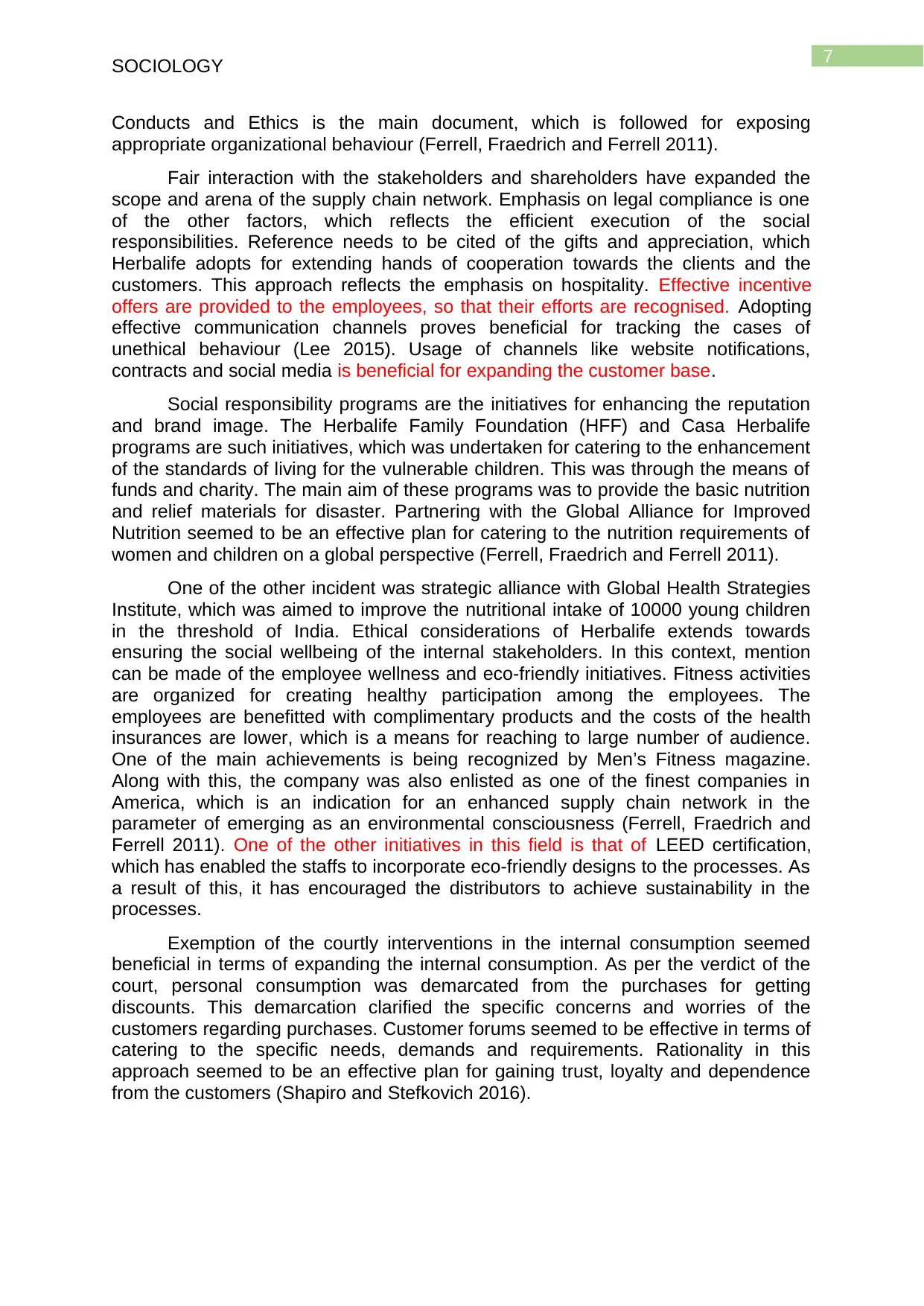
7
SOCIOLOGY
Conducts and Ethics is the main document, which is followed for exposing
appropriate organizational behaviour (Ferrell, Fraedrich and Ferrell 2011).
Fair interaction with the stakeholders and shareholders have expanded the
scope and arena of the supply chain network. Emphasis on legal compliance is one
of the other factors, which reflects the efficient execution of the social
responsibilities. Reference needs to be cited of the gifts and appreciation, which
Herbalife adopts for extending hands of cooperation towards the clients and the
customers. This approach reflects the emphasis on hospitality. Effective incentive
offers are provided to the employees, so that their efforts are recognised. Adopting
effective communication channels proves beneficial for tracking the cases of
unethical behaviour (Lee 2015). Usage of channels like website notifications,
contracts and social media is beneficial for expanding the customer base.
Social responsibility programs are the initiatives for enhancing the reputation
and brand image. The Herbalife Family Foundation (HFF) and Casa Herbalife
programs are such initiatives, which was undertaken for catering to the enhancement
of the standards of living for the vulnerable children. This was through the means of
funds and charity. The main aim of these programs was to provide the basic nutrition
and relief materials for disaster. Partnering with the Global Alliance for Improved
Nutrition seemed to be an effective plan for catering to the nutrition requirements of
women and children on a global perspective (Ferrell, Fraedrich and Ferrell 2011).
One of the other incident was strategic alliance with Global Health Strategies
Institute, which was aimed to improve the nutritional intake of 10000 young children
in the threshold of India. Ethical considerations of Herbalife extends towards
ensuring the social wellbeing of the internal stakeholders. In this context, mention
can be made of the employee wellness and eco-friendly initiatives. Fitness activities
are organized for creating healthy participation among the employees. The
employees are benefitted with complimentary products and the costs of the health
insurances are lower, which is a means for reaching to large number of audience.
One of the main achievements is being recognized by Men’s Fitness magazine.
Along with this, the company was also enlisted as one of the finest companies in
America, which is an indication for an enhanced supply chain network in the
parameter of emerging as an environmental consciousness (Ferrell, Fraedrich and
Ferrell 2011). One of the other initiatives in this field is that of LEED certification,
which has enabled the staffs to incorporate eco-friendly designs to the processes. As
a result of this, it has encouraged the distributors to achieve sustainability in the
processes.
Exemption of the courtly interventions in the internal consumption seemed
beneficial in terms of expanding the internal consumption. As per the verdict of the
court, personal consumption was demarcated from the purchases for getting
discounts. This demarcation clarified the specific concerns and worries of the
customers regarding purchases. Customer forums seemed to be effective in terms of
catering to the specific needs, demands and requirements. Rationality in this
approach seemed to be an effective plan for gaining trust, loyalty and dependence
from the customers (Shapiro and Stefkovich 2016).
SOCIOLOGY
Conducts and Ethics is the main document, which is followed for exposing
appropriate organizational behaviour (Ferrell, Fraedrich and Ferrell 2011).
Fair interaction with the stakeholders and shareholders have expanded the
scope and arena of the supply chain network. Emphasis on legal compliance is one
of the other factors, which reflects the efficient execution of the social
responsibilities. Reference needs to be cited of the gifts and appreciation, which
Herbalife adopts for extending hands of cooperation towards the clients and the
customers. This approach reflects the emphasis on hospitality. Effective incentive
offers are provided to the employees, so that their efforts are recognised. Adopting
effective communication channels proves beneficial for tracking the cases of
unethical behaviour (Lee 2015). Usage of channels like website notifications,
contracts and social media is beneficial for expanding the customer base.
Social responsibility programs are the initiatives for enhancing the reputation
and brand image. The Herbalife Family Foundation (HFF) and Casa Herbalife
programs are such initiatives, which was undertaken for catering to the enhancement
of the standards of living for the vulnerable children. This was through the means of
funds and charity. The main aim of these programs was to provide the basic nutrition
and relief materials for disaster. Partnering with the Global Alliance for Improved
Nutrition seemed to be an effective plan for catering to the nutrition requirements of
women and children on a global perspective (Ferrell, Fraedrich and Ferrell 2011).
One of the other incident was strategic alliance with Global Health Strategies
Institute, which was aimed to improve the nutritional intake of 10000 young children
in the threshold of India. Ethical considerations of Herbalife extends towards
ensuring the social wellbeing of the internal stakeholders. In this context, mention
can be made of the employee wellness and eco-friendly initiatives. Fitness activities
are organized for creating healthy participation among the employees. The
employees are benefitted with complimentary products and the costs of the health
insurances are lower, which is a means for reaching to large number of audience.
One of the main achievements is being recognized by Men’s Fitness magazine.
Along with this, the company was also enlisted as one of the finest companies in
America, which is an indication for an enhanced supply chain network in the
parameter of emerging as an environmental consciousness (Ferrell, Fraedrich and
Ferrell 2011). One of the other initiatives in this field is that of LEED certification,
which has enabled the staffs to incorporate eco-friendly designs to the processes. As
a result of this, it has encouraged the distributors to achieve sustainability in the
processes.
Exemption of the courtly interventions in the internal consumption seemed
beneficial in terms of expanding the internal consumption. As per the verdict of the
court, personal consumption was demarcated from the purchases for getting
discounts. This demarcation clarified the specific concerns and worries of the
customers regarding purchases. Customer forums seemed to be effective in terms of
catering to the specific needs, demands and requirements. Rationality in this
approach seemed to be an effective plan for gaining trust, loyalty and dependence
from the customers (Shapiro and Stefkovich 2016).
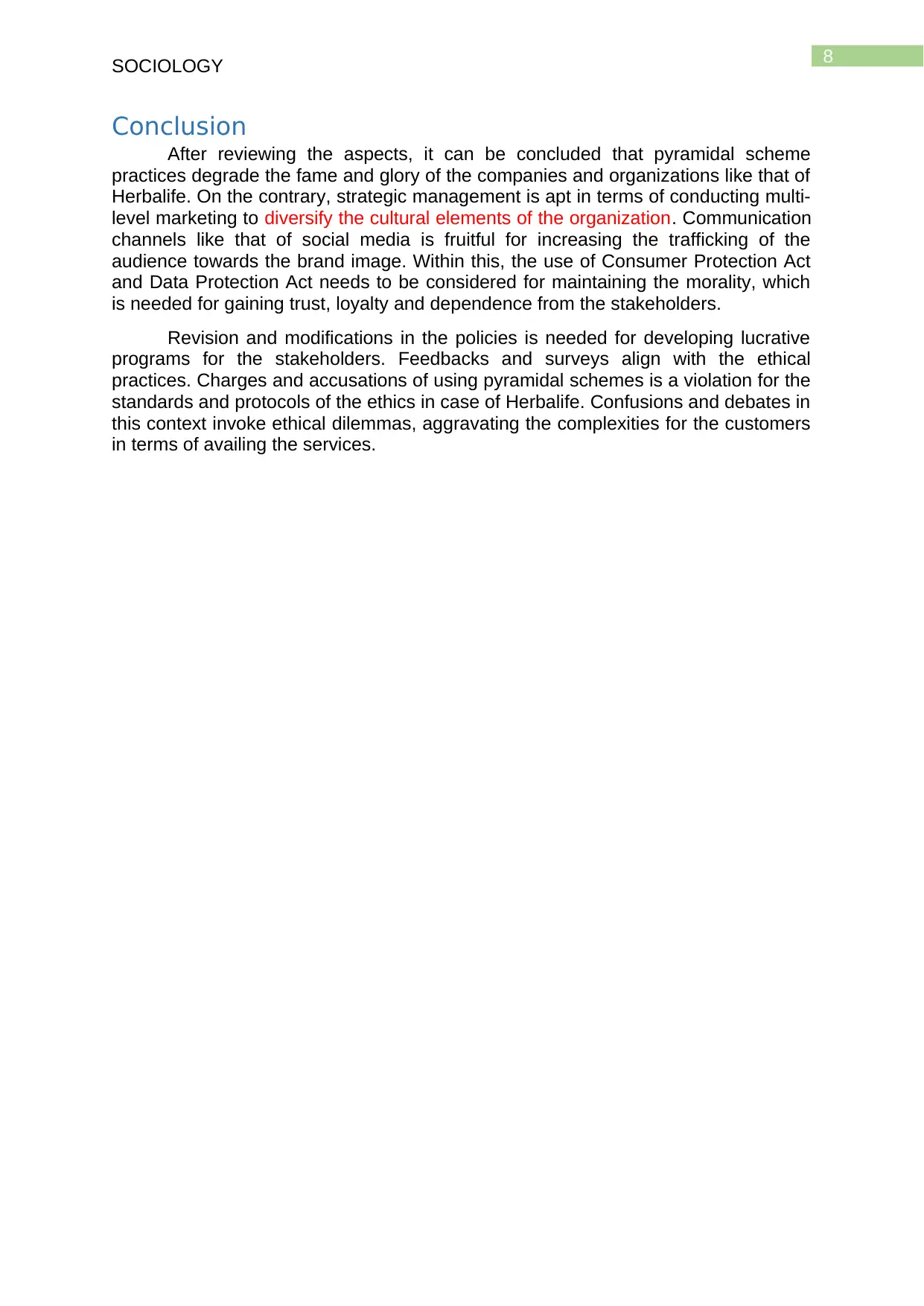
8
SOCIOLOGY
Conclusion
After reviewing the aspects, it can be concluded that pyramidal scheme
practices degrade the fame and glory of the companies and organizations like that of
Herbalife. On the contrary, strategic management is apt in terms of conducting multi-
level marketing to diversify the cultural elements of the organization. Communication
channels like that of social media is fruitful for increasing the trafficking of the
audience towards the brand image. Within this, the use of Consumer Protection Act
and Data Protection Act needs to be considered for maintaining the morality, which
is needed for gaining trust, loyalty and dependence from the stakeholders.
Revision and modifications in the policies is needed for developing lucrative
programs for the stakeholders. Feedbacks and surveys align with the ethical
practices. Charges and accusations of using pyramidal schemes is a violation for the
standards and protocols of the ethics in case of Herbalife. Confusions and debates in
this context invoke ethical dilemmas, aggravating the complexities for the customers
in terms of availing the services.
SOCIOLOGY
Conclusion
After reviewing the aspects, it can be concluded that pyramidal scheme
practices degrade the fame and glory of the companies and organizations like that of
Herbalife. On the contrary, strategic management is apt in terms of conducting multi-
level marketing to diversify the cultural elements of the organization. Communication
channels like that of social media is fruitful for increasing the trafficking of the
audience towards the brand image. Within this, the use of Consumer Protection Act
and Data Protection Act needs to be considered for maintaining the morality, which
is needed for gaining trust, loyalty and dependence from the stakeholders.
Revision and modifications in the policies is needed for developing lucrative
programs for the stakeholders. Feedbacks and surveys align with the ethical
practices. Charges and accusations of using pyramidal schemes is a violation for the
standards and protocols of the ethics in case of Herbalife. Confusions and debates in
this context invoke ethical dilemmas, aggravating the complexities for the customers
in terms of availing the services.
⊘ This is a preview!⊘
Do you want full access?
Subscribe today to unlock all pages.

Trusted by 1+ million students worldwide
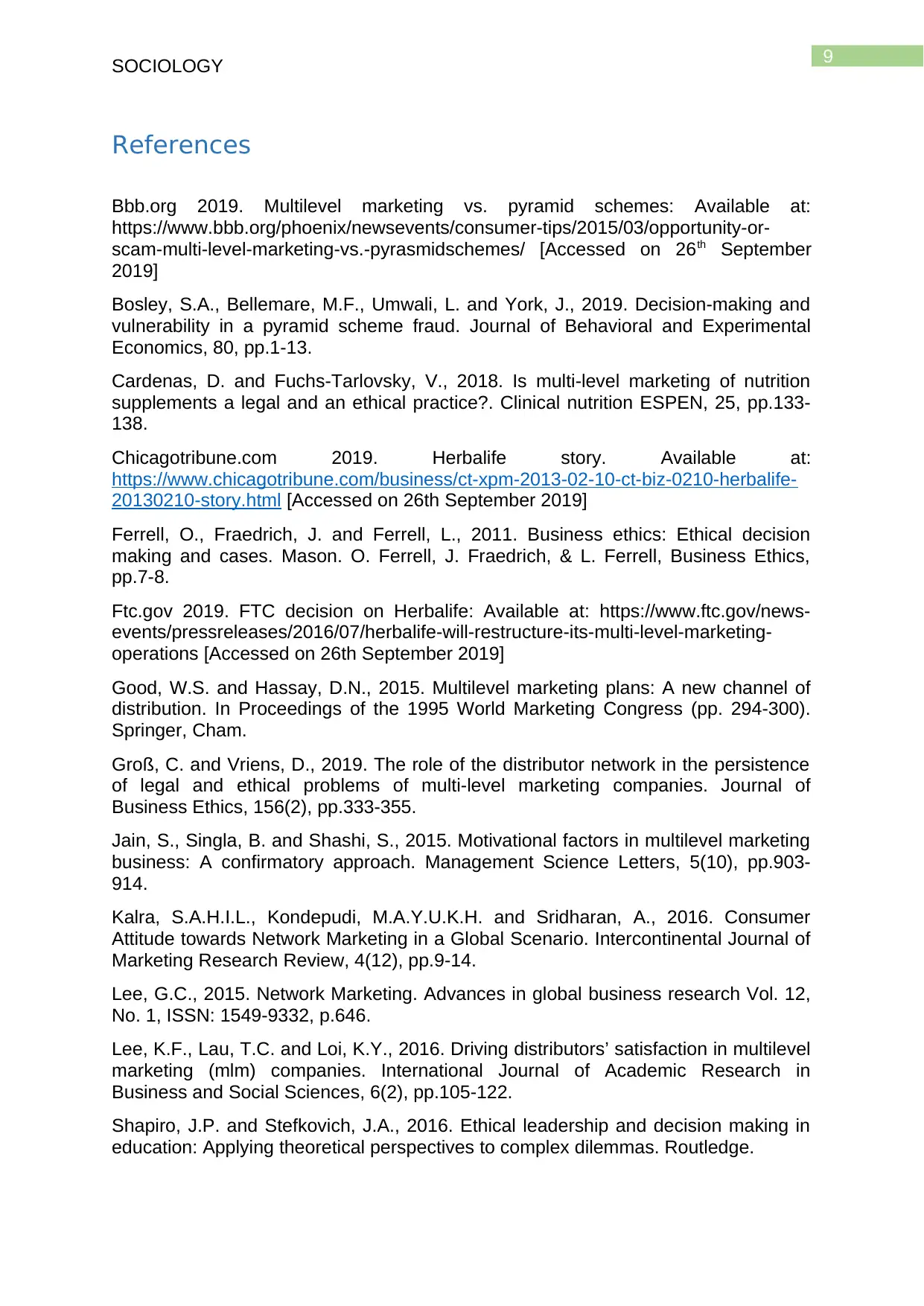
9
SOCIOLOGY
References
Bbb.org 2019. Multilevel marketing vs. pyramid schemes: Available at:
https://www.bbb.org/phoenix/newsevents/consumer-tips/2015/03/opportunity-or-
scam-multi-level-marketing-vs.-pyrasmidschemes/ [Accessed on 26th September
2019]
Bosley, S.A., Bellemare, M.F., Umwali, L. and York, J., 2019. Decision-making and
vulnerability in a pyramid scheme fraud. Journal of Behavioral and Experimental
Economics, 80, pp.1-13.
Cardenas, D. and Fuchs-Tarlovsky, V., 2018. Is multi-level marketing of nutrition
supplements a legal and an ethical practice?. Clinical nutrition ESPEN, 25, pp.133-
138.
Chicagotribune.com 2019. Herbalife story. Available at:
https://www.chicagotribune.com/business/ct-xpm-2013-02-10-ct-biz-0210-herbalife-
20130210-story.html [Accessed on 26th September 2019]
Ferrell, O., Fraedrich, J. and Ferrell, L., 2011. Business ethics: Ethical decision
making and cases. Mason. O. Ferrell, J. Fraedrich, & L. Ferrell, Business Ethics,
pp.7-8.
Ftc.gov 2019. FTC decision on Herbalife: Available at: https://www.ftc.gov/news-
events/pressreleases/2016/07/herbalife-will-restructure-its-multi-level-marketing-
operations [Accessed on 26th September 2019]
Good, W.S. and Hassay, D.N., 2015. Multilevel marketing plans: A new channel of
distribution. In Proceedings of the 1995 World Marketing Congress (pp. 294-300).
Springer, Cham.
Groß, C. and Vriens, D., 2019. The role of the distributor network in the persistence
of legal and ethical problems of multi-level marketing companies. Journal of
Business Ethics, 156(2), pp.333-355.
Jain, S., Singla, B. and Shashi, S., 2015. Motivational factors in multilevel marketing
business: A confirmatory approach. Management Science Letters, 5(10), pp.903-
914.
Kalra, S.A.H.I.L., Kondepudi, M.A.Y.U.K.H. and Sridharan, A., 2016. Consumer
Attitude towards Network Marketing in a Global Scenario. Intercontinental Journal of
Marketing Research Review, 4(12), pp.9-14.
Lee, G.C., 2015. Network Marketing. Advances in global business research Vol. 12,
No. 1, ISSN: 1549-9332, p.646.
Lee, K.F., Lau, T.C. and Loi, K.Y., 2016. Driving distributors’ satisfaction in multilevel
marketing (mlm) companies. International Journal of Academic Research in
Business and Social Sciences, 6(2), pp.105-122.
Shapiro, J.P. and Stefkovich, J.A., 2016. Ethical leadership and decision making in
education: Applying theoretical perspectives to complex dilemmas. Routledge.
SOCIOLOGY
References
Bbb.org 2019. Multilevel marketing vs. pyramid schemes: Available at:
https://www.bbb.org/phoenix/newsevents/consumer-tips/2015/03/opportunity-or-
scam-multi-level-marketing-vs.-pyrasmidschemes/ [Accessed on 26th September
2019]
Bosley, S.A., Bellemare, M.F., Umwali, L. and York, J., 2019. Decision-making and
vulnerability in a pyramid scheme fraud. Journal of Behavioral and Experimental
Economics, 80, pp.1-13.
Cardenas, D. and Fuchs-Tarlovsky, V., 2018. Is multi-level marketing of nutrition
supplements a legal and an ethical practice?. Clinical nutrition ESPEN, 25, pp.133-
138.
Chicagotribune.com 2019. Herbalife story. Available at:
https://www.chicagotribune.com/business/ct-xpm-2013-02-10-ct-biz-0210-herbalife-
20130210-story.html [Accessed on 26th September 2019]
Ferrell, O., Fraedrich, J. and Ferrell, L., 2011. Business ethics: Ethical decision
making and cases. Mason. O. Ferrell, J. Fraedrich, & L. Ferrell, Business Ethics,
pp.7-8.
Ftc.gov 2019. FTC decision on Herbalife: Available at: https://www.ftc.gov/news-
events/pressreleases/2016/07/herbalife-will-restructure-its-multi-level-marketing-
operations [Accessed on 26th September 2019]
Good, W.S. and Hassay, D.N., 2015. Multilevel marketing plans: A new channel of
distribution. In Proceedings of the 1995 World Marketing Congress (pp. 294-300).
Springer, Cham.
Groß, C. and Vriens, D., 2019. The role of the distributor network in the persistence
of legal and ethical problems of multi-level marketing companies. Journal of
Business Ethics, 156(2), pp.333-355.
Jain, S., Singla, B. and Shashi, S., 2015. Motivational factors in multilevel marketing
business: A confirmatory approach. Management Science Letters, 5(10), pp.903-
914.
Kalra, S.A.H.I.L., Kondepudi, M.A.Y.U.K.H. and Sridharan, A., 2016. Consumer
Attitude towards Network Marketing in a Global Scenario. Intercontinental Journal of
Marketing Research Review, 4(12), pp.9-14.
Lee, G.C., 2015. Network Marketing. Advances in global business research Vol. 12,
No. 1, ISSN: 1549-9332, p.646.
Lee, K.F., Lau, T.C. and Loi, K.Y., 2016. Driving distributors’ satisfaction in multilevel
marketing (mlm) companies. International Journal of Academic Research in
Business and Social Sciences, 6(2), pp.105-122.
Shapiro, J.P. and Stefkovich, J.A., 2016. Ethical leadership and decision making in
education: Applying theoretical perspectives to complex dilemmas. Routledge.
Paraphrase This Document
Need a fresh take? Get an instant paraphrase of this document with our AI Paraphraser
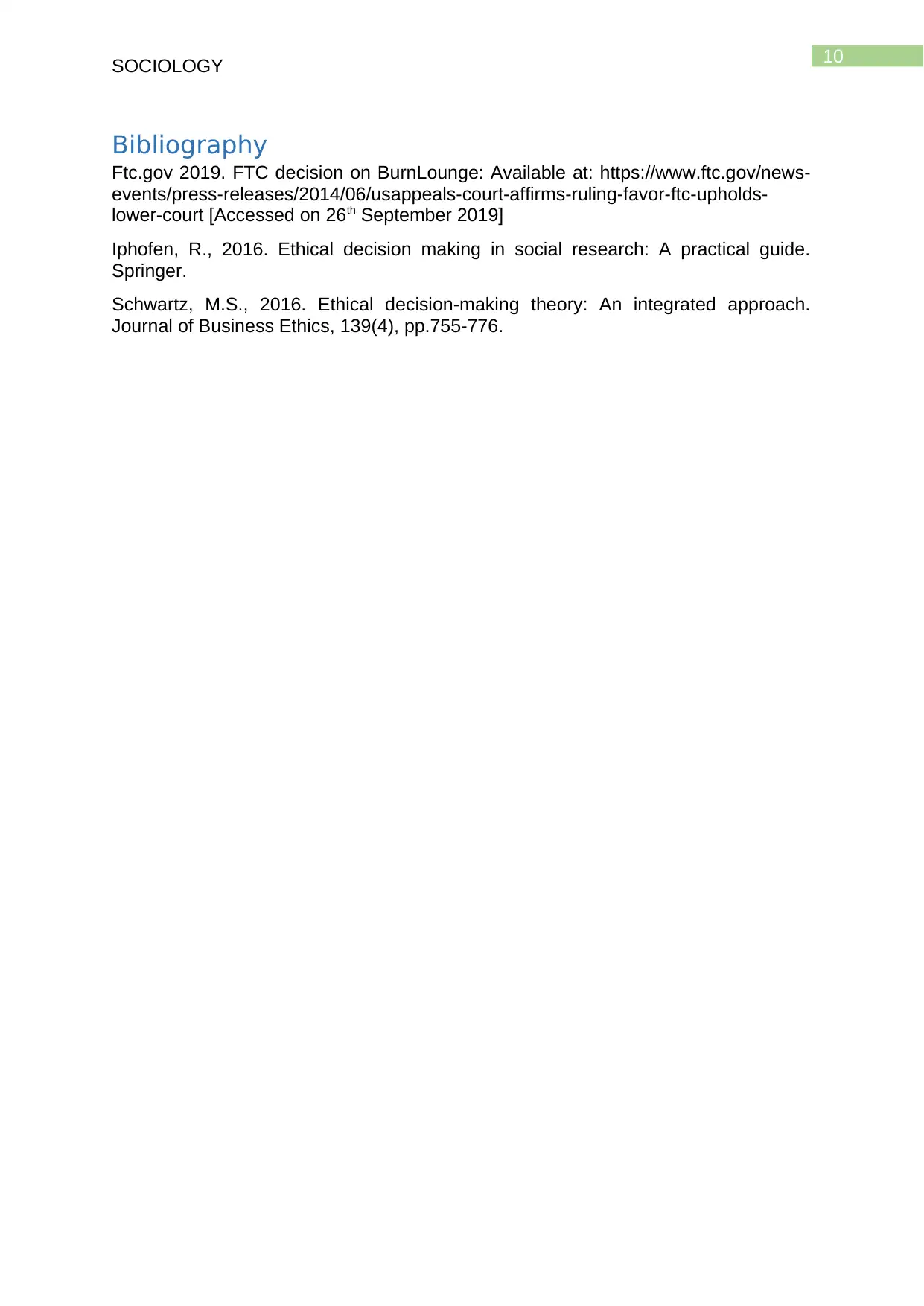
10
SOCIOLOGY
Bibliography
Ftc.gov 2019. FTC decision on BurnLounge: Available at: https://www.ftc.gov/news-
events/press-releases/2014/06/usappeals-court-affirms-ruling-favor-ftc-upholds-
lower-court [Accessed on 26th September 2019]
Iphofen, R., 2016. Ethical decision making in social research: A practical guide.
Springer.
Schwartz, M.S., 2016. Ethical decision-making theory: An integrated approach.
Journal of Business Ethics, 139(4), pp.755-776.
SOCIOLOGY
Bibliography
Ftc.gov 2019. FTC decision on BurnLounge: Available at: https://www.ftc.gov/news-
events/press-releases/2014/06/usappeals-court-affirms-ruling-favor-ftc-upholds-
lower-court [Accessed on 26th September 2019]
Iphofen, R., 2016. Ethical decision making in social research: A practical guide.
Springer.
Schwartz, M.S., 2016. Ethical decision-making theory: An integrated approach.
Journal of Business Ethics, 139(4), pp.755-776.
1 out of 11
Your All-in-One AI-Powered Toolkit for Academic Success.
+13062052269
info@desklib.com
Available 24*7 on WhatsApp / Email
![[object Object]](/_next/static/media/star-bottom.7253800d.svg)
Unlock your academic potential
Copyright © 2020–2025 A2Z Services. All Rights Reserved. Developed and managed by ZUCOL.